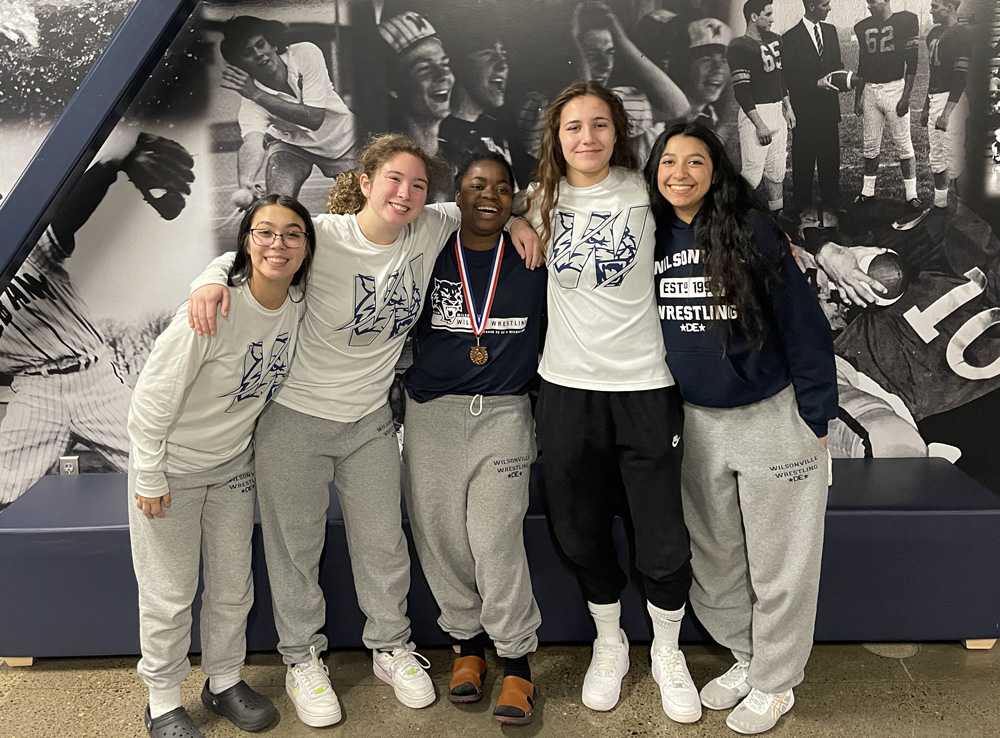
Venelle Imbi is on the wrestling mat. The Wilsonville High School senior is looking for the arm bar she’s been perfecting since first coming to the sport three years ago. If she gets it, and it leads to a win, she will move one step closer to her goal of making the state meet, something that eluded her by one match a year ago.
Imbi said that she fell in love with wrestling for several reasons: It kept her fit. It required toughness. Not everyone could do it successfully.
For the most part, however, Imbi liked wrestling because it was a new sport for girls. As a female wrestler, she felt like a trailblazer; a role model.
“You can get someone interested in wrestling who never thought about it before,” she explained.
***
Five years earlier, Imbi was a world away from the wrestling room at Wilsonville. She was 13 years old when her father announced that she and two siblings would be moving with him to America from the Democratic Republic of the Congo.
Imbi felt mostly indifference at the news.
“I didn’t know what to expect,” she said.
Imbi had already moved once, from the Central African Republic, where she was born, to the neighboring DRC, at age 9. Imbi said they left the CAR for better educational opportunities, though a sectarian civil war and extreme poverty likely also motivated the move.
The education was better in the DRC but it wasn’t good enough. Imbi’s father, who never finished high school himself, wanted more for his family. When the opportunity arose to move one-third of the way around the world, to Portland, as part of a United Nations resettlement program for refugees, he jumped at the chance.
Imbi said that she wasn’t aware of the impoverished conditions and history of violence, especially against women, in the DRC when she lived there. She saw mostly community, where people spent their time outdoors. Together. She had lots of friends. It was fun. She wasn’t sure the move to the U.S. would be best for her. She was fluent in three languages but English was not one of them. It felt to her like starting over.
***
Once the family eventually settled into an apartment complex in Wilsonville, Imbi noticed some things about her new home.
First, people lived mostly indoors and kept largely to themselves.
Second, it rained. A lot.
“It rains constantly,” she said. “It’s terrible. I have to get used to it. My sister and I drink hot chocolate and watch the rain on weekends.”
Third, the use of technology was ever present. If she needed to know something, she could just ask Google.
Imbi also discovered that she was a member of the minority for the first time in predominantly white Oregon. It’s something she was aware of, but she said that being different than the majority population was not something that impacted her day-to-day life.
“I see them as people,” she explained. “As long as they see me as people then we’re cool. That’s what matters. It’s cool to see other people and learn what they do and what they’re like.”
***
Jason Milham is a science teacher and the head wrestling coach at Wilsonville. When Imbi was a freshman, Milham saw her in his classroom taking a class for language learners during his prep period. He approached her about coming out for the wrestling team. Imbi was naturally athletic. She’d run track and cross country and played basketball in middle school. She added tennis and soccer during her high school years, but was hesitant to try wrestling.
One year later, Imbi came to Milham independently and asked whether she could still come out for the team.
“From the beginning, Venelle has been a good worker, quick learner, and tough wrestler,” Milham said. “She has a competitive spirit and, when she steps on the mat to wrestle, she attacks her opponent and wrestles aggressively. As she has worked and developed her knowledge of the sport, she has been able to have greater success and find more ways to win matches.”
Milham said that any initial language barriers were mitigated by the physical nature of wrestling itself.
“A lot of communication and learning can be by showing and doing, so that made teaching her the basics less difficult,” he explained. “Beyond that though, her grasp of language was solid. The only real communication issues we had initially was to maybe slow down our speed of speech here and there; otherwise she did not have issues understanding or making herself understood.”
In her three years in the program, Imbi’s work ethic and coachability have set her apart and helped her make rapid improvement.
“Venelle has always been willing to learn, and engages with coaches and her learning in positive ways,” Milham said. “She doesn't like to lose and takes the time at practice to ask questions and work on getting better in areas where she needs improvement.”
***
Wrestling, Imbi said, has taught her that you need to be consistent to improve. It’s a lesson she will take with her when she leaves the sport for good at the end of the season. Imbi, a good student who works hard, has been accepted to Pacific University in Forest Grove. She’ll probably attend there to further her education while she figures out the bigger life goals that lay ahead. She enjoys fashion design and actively sews and crochets, so maybe her future lies in these pursuits.
“I plan finish school to have a better vision,” she said. “I’m going to let life surprise me. In a good way.”
***
Imbi is 20-5 on the mat so far this season. She expects to wrestle at 130 pounds for districts. She wants to qualify for the state tournament and wrestle there to the best of her ability.
Even should she fall short of this goal, however, Imbi will be just fine.
After all, she’s already come such a long way.









